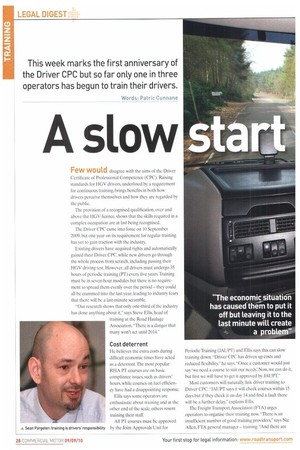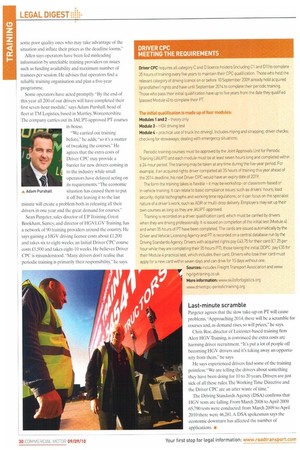A sto w
Page 148

Page 150

If you've noticed an error in this article please click here to report it so we can fix it.
This week marks the first anniversary of the Driver CPC but so far only one in three operators has begun to train their drivers.
Words: Patric Cunnarit Few would disagree with the aims of the Driver Certificate of Professional Competence (CPC). Raising standards for HGV drivers, underlined by a requirement for continuous training, brings benefits in both how drivers perceive themselves and how they are regarded by the public.
The provision of a recognised qualification, over and above the HGV licence, shows that the skills required in a complex occupation are at last being recognised.
The Driver CPC came into force on 10 September 2009, but one year on its requirement for regular training has yet to gain traction with the industry Existing drivers have acquired rights and automatically gained their Driver CPC, while new drivers go through the whole process from scratch, including passing their HGV driving test. However, all drivers must undergo 35 hours of periodic training (PT) every five years Training must be in seven-hour modules but there is no requirement to spread them evenly over the period they could all be crammed into the last year, leading to industry fears that there will be a last-minute scramble.
"Our research shows that only one-third of the industry has done anything about it," says Steve Ellis, head of training at the Road Haulage Association. "There is a danger that many won't act until 2014."
Cost deterrent
He believes the extra costs during difficult economic times have acted as a deterrent.The most popular RHA PT courses are on basic compliance issues, such as drivers' hours, while courses on fuel efficiency have had a disappointing response.
Ellis says some operators are enthusiastic about training and at the other end of the scale, others resent training their staff.
All PT courses must be approved by the Joint Approvals Unit for Periodic Training (JAUPT) and Ellis says this can slow training down. "Driver CPC has driven up costs and reduced flexibility.he says. "Once a customer would just say 'we need a course to suit our needs: Now, we can do it, but first we will have to get it approved by JAUFT."
Most customers will naturally link driver training to Driver CPC."JAUPT says it will check courses within 15 days but if they check it on day 14 and find a fault there will be a further delay," explains Ellis.
The Freight Transport Association (FTA) urges operators to organise their training now, "There is an insufficient number of good training providers," says Nic Allen. FTA general manager — training. "And there are some poor quality ones who may take advantage of the situation and inflate their prices as the deadline looms."
Allen says operators have been fed misleading information by unreliable training providers on issues such as funding availability and maximum number of trainees per session. He advises that operators find a reliable training organisation and plan a five-year programme.
Some operators have acted promptly. "By the end of this year all 200 of our drivers will have completed their first seven-hour module.says Adam Purshall, head of fleet at TM Logistics, based in Martley, Worcestershire. The company carries out its JAUPT-approved PT courses in-house.
"We carried out training before." he adds, "so it's a matter of tweaking the courses" He agrees that the extra costs of Driver CPC may provide a barrier for new drivers coming in to the industry while small operators have delayed acting on its requirements. "The economic Adam Purshall situation has caused them to put it off but leaving it to the last minute will create a problem both in releasing all their drivers in one year and the great demand for courses."
Sean Pargeter, sales director of EP Training. Great Bookham, Surrey, and director of HGVLGV Training, has a network of 90 training providers around the country. He says gaining a HGV driving licence costs about £1,200 and takes six to eight weeks: an Initial Driver CPC course costs £1,500 and takes eight-10 weeks He believes Driver CPC is misunderstood. "Many drivers don't realise that periodic training is primarily their responsibility," he says.
Last-minute scramble
Pargeter agrees that the slow take-up on PT will cause problems. "Approaching 2014. there will be a scramble for courses and, as demand rises, so will prices," he says.
Chris Roe, director of Leicester-based training firm Alert HGV Training, is convinced the extra costs are harming driver recruitment. "It's put a lot of people off becoming HGV drivers and it's taking away an opportunity from them." he says.
He says experienced drivers find some of the training pointless: "We are telling the drivers about something they have been doing for 10 to 20 years. Drivers are just sick of all these rules. The Working Time Directive and the Driver CPC are an utter waste of time."
The Driving Standards Agency (DSA) confirms that HGV tests arc falling. From March 2008 to April 2009 65,790 tests were conducted; from March 2009 to April 2010 there were 46,281.A DSA spokesman says the economic downturn has affected the number of applications. •
























































































































































































































































